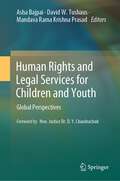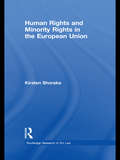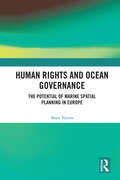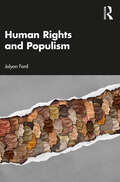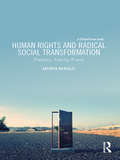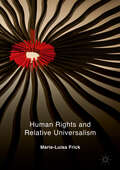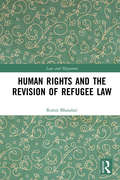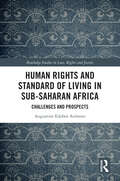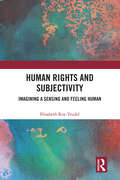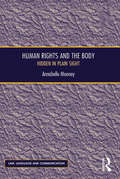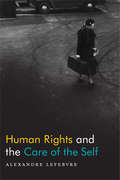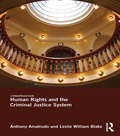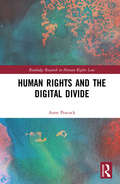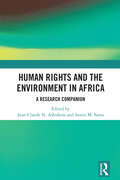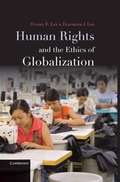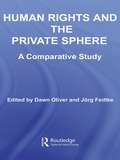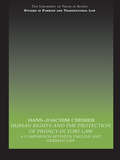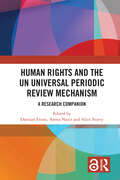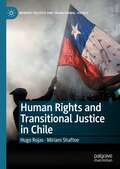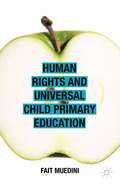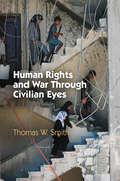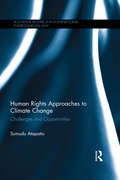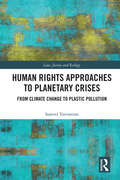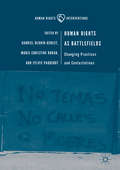- Table View
- List View
Human Rights and Legal Services for Children and Youth: Global Perspectives
by Asha Bajpai David W. Tushaus Mandava Rama Krishna PrasadThis book discusses legal services clinics and various other access-to-justice initiatives that are established to protect and represent the rights and interests of children and youth in several countries across the globe. These could include legal services or access-to-justice clinics run by government or universities or community. The book has contributions from academicians, lawyers, researchers and legal professionals from several counties including India, UK, USA, Brazil, Australia, Indonesia, Poland, and Spain, which discuss how they represent children and youth in their countries. The book looks at how these access-to-justice initiatives currently provide assistance, what are the child friendly justice procedures they use, and best practices that can be replicable in other jurisdictions. The chapters contain findings of field research studies, some case studies, and models related to these topics. There are recommendations on ways to strengthen access-to-justice and legal services for empowering children and youth. The main goal is to create a resource for readers who want to expand child advocacy opportunities in their own universities and communities. The reader may also learn how to conduct legislative advocacy and case law advocacy to improve laws in other jurisdictions; and take-away best and replicable initiatives. The practices could be adaptable by other clinics and countries. The book will be useful to child rights advocates and defenders, students of law, legal researchers, civil society organizations, legal services authorities, legal aid institutions, educational institutions, school authorities, juvenile justice authorities, clinical legal educators, justice educators, justice practitioners and law and policy makers.
Human Rights and Minority Rights in the European Union (Routledge Research in EU Law)
by Kirsten ShorakaThe end of the Cold War has ushered a restructuring of the institutions of the European Community, culminating into its enlargement to Eastern Europe, under the aegis of economic integration, democracy and human rights. This book examines the development and the role of human rights in the European Union, from its inception as an economic co-operation project to an organisation of European States with a political agenda that goes beyond its borders. It argues that human rights have become an important component of the foreign policy of the European Union and that this role has grown from the inception of the Union through the Cold War and thereafter onto the process of enlargement of the Union. The book goes on to analyse the EU’s policy on minorities, as a particular example of human rights. It considers the level of their protection within the EU and the framework of international law, and compares minority rights in the older Member States including France, Germany and the UK, with newer Eastern European states.
Human Rights and Ocean Governance: The Potential of Marine Spatial Planning in Europe
by Mara NtonaThis book argues for the utility of human rights in the practice of ocean governance. Maritime spatial planning (MSP) has become the dominant marine management paradigm, with MSP frameworks already at various stages of elaboration and implementation in more than half of all coastal states. However, as experience with MSP accrues, a central systemic shortcoming has become apparent, insofar as the normative frameworks that underpin MSP tend to be grounded in a rationalistic and economistic worldview. The result is a post-political, neoliberal approach to the implementation of MSP, which favours technocratic ‘fixes’ to complex societal problems over efforts to address underlying issues of power and inequality. Building upon the new field of critical MSP studies, this book offers a much-neglected legal contribution. More specifically, it analyses the extent to which law, and particularly human rights law, can be utilised to meaningfully challenge the unjust patterns of human-ocean interaction that MSP preserves or creates, and so provide a vehicle for the formulation and realisation of transformative blue futures. The book looks to human rights as norms that are uniquely capable of bringing into relief the values, cause-and-effect relationships, and uncertainties that prevailing capitalist-industrial framings of the ocean tend to downplay or, worse, disregard. And so, from a more pragmatic viewpoint, the book argues that the policy and advocacy tools associated with human rights can be used within MSP processes to foster patterns of human-ocean interaction which are more conducive to social and environmental justice. This book will be of interest to legal and planning scholars, geographers, and others concerned with ocean governance and the ‘blue turn’ in the social sciences and humanities more generally.
Human Rights and Populism
by Jolyon FordFor decades, framing an issue as a ‘human rights’ issue carried certain power and effect in politics and international relations, one that has been challenged by the recent rise of populist political forces. Ford explores the recent impact of populist politics on the universalist human rights project, in particular, how scholars have framed and responded to this challenge. Ford offers a provocation to the human rights movement. Rather than ‘what have populists done to human rights?’, it asks ‘how did we, the human rights movement, do this to ourselves?’ How did fundamental protections for all become so easily scapegoated as ‘us and them,’ as claims of small, often foreign, minorities? Did human rights lose some vital connection to ordinary people’s interests, their value taken as obvious and self-explanatory? Looking forward, the book asks how – in a post-truth ‘fake news’ world – we might reimagine human rights as underpinning human flourishing as well as important constraints on public and private concentrations of power. Traversing relevant scholarly literature on the future of human rights and zooming out to look at wider patterns of political and diplomatic discourse, this book will speak to policymakers, diplomats, journalists, and human rights advocates – and all interested in the crisis of liberal democracies.
Human Rights and Radical Social Transformation: Futurity, Alterity, Power
by Kathryn McNeillyAgainst the recent backdrop of sociopolitical crisis, radical thinking and activism to challenge the oppressive operation of power has increased. Such thinkers and activists have aimed for radical social transformation in the sense of challenging dominant ways of viewing the world, including the neoliberal illusion of improving the welfare of all while advancing the interests of only some. However, a question mark has remained over the utility of human rights in this activity and the capability of rights to challenge, as opposed to reinforce, discourses such as liberalism, capitalism, internationalism and statism. It is at this point that the present work aims to intervene. Drawing upon critical legal theory, radical democratic thinking and feminist perspectives, Human Rights and Radical Social Transformation seeks to reassess the radical possibilities for human rights and explore how rights may be re-engaged as a tool to facilitate radical social change via the concept of ‘human rights to come’. This idea proposes a reconceptualisation of human rights in theory and practice which foregrounds human rights as inherently futural and capable of sustaining a critical relation to power and alterity in radical politics.
Human Rights and Relative Universalism
by Marie-Luisa FrickThis book argues that human rights cannot go global without going local. This important lesson from the winding debates on universalism and particularism raises intricate questions: what are human rights after all, given the dissent surrounding their foundations, content, and scope? What are legitimate deviances from classical human rights (law) and where should we draw “red lines”? Making a case for balancing conceptual openness and distinctness, this book addresses the key human rights issues of our time and opens up novel spaces for deliberation. It engages philosophical reasoning with law, politics, and religion and demonstrates that a meaningful relativist account of human rights is not only possible, but a sorely needed antidote to dogmatism and polarization.
Human Rights and The Revision of Refugee Law (Law and Migration)
by Romit BhandariThis book addresses the relationship between International Refugee Law and International Human Rights Law. Using international refugee law’s analytical turn to human rights as its object of inquiry, it represents a critical intervention into the revisionism that has led to conceptual fragmentation and restrictive practices. Mainstream literature in refugee law reflects a mood of celebration, a narrative of progress which praises the discipline’s rescue from obsolescence. This is commonly ascribed to its repositioning alongside human rights law, its veritable rediscovery as an arm of this far greater edifice. By using human rights logic to construct the current legal paradigm and inform us of who qualifies as a refugee, this purportedly lent areas of conceptual uncertainty a set of objective, modern criteria and increased enfranchisement to new, non-traditional claimants. The present work challenges this dominant position by finding the untold limits of its current paradigm. It stands alone in this orientation and hereby represents one of the most comprehensive, heterodox and structurally detailed reviews of this connection. The exploration of the gap between modern approaches and the unsatisfactory realities of seeking asylum forms the substance of this book. It asserts, by contrast, the existence of revolution rather than evolution. Human rights law has erased the founding tenets of the Refugee Convention, enabling powerful states to contain refugees in their region of origin. The book will be essential reading for those interested in Refugee Law, Refugee Studies, Postcolonial Legal Studies, Postmodern Critiques and Critical Legal Theory. Additionally, given its relevance for the adjudication of refugee claims, it will be an important resource for solicitors, barristers and judges.
Human Rights and Standard of Living in Sub-Saharan Africa: Challenges and Prospects (Routledge Studies in Law, Rights and Justice)
by Augustine Edobor ArimoroThis book offers a comprehensive and nuanced examination of the right to an adequate standard of living in Sub-Saharan Africa (SSA), shedding light on the multifaceted challenges, opportunities, and imperatives for action. The right to an adequate standard of living is a fundamental human right, essential for the dignity and well-being of all individuals. Yet, in SSA, the realisation of this right remains a complex and elusive goal, with millions of people facing poverty, inequality, and limited access to basic services. Through a series of in-depth chapters, the book explores the various dimensions of the right to an adequate standard of living, from the pervasive impacts of poverty and inequality to the critical importance of access to healthcare, education, housing, and justice. Drawing on a rich array of case studies, data, and expert analysis, the work provides a compelling and evidence-based assessment of the current state of affairs in SSA, highlighting the urgent need for comprehensive and context-specific approaches to advancing this fundamental right. Providing a roadmap for promoting sustainable and inclusive development, reducing poverty and inequality, and ensuring access to basic services for all, the volume offers a set of actionable recommendations for policymakers, practitioners, and researchers working in the areas of Human Rights Law, Development Law and, in particular, those focused on the United Nations Sustainable Development Goals. At the same time, it identifies key areas for further research and investigation, underscoring the importance of ongoing knowledge generation and exchange in support of evidence-based policy and practice.
Human Rights and Subjectivity: Imagining a Sensing and Feeling Human
by Elisabeth Roy-TrudelThis book draws on a range of theoretical frameworks to challenge the limited conception of subjectivity upon which human rights are based.The book focuses on some of the ways in which dominant discourses are in tension with human rights’ fundamental claim to universality by ignoring multiple ways of being. Different theoretical and methodological approaches are used to analyse this creation of exclusions. These include Hannah Arendt’s figure of the refugee, posthumanist critiques and non-Western critical theories such as Black, Indigenous and decolonial approaches. Often these approaches are used in isolation, but together they reveal how the dominant concept of subjectivity has always needed an ‘Other’ and that the ‘human’ at the heart of human rights is not a universal concept. The book also pursues an analysis of visual discourses in the field of international human rights, with a focus on the ways in which exclusions are represented and entrenched through the visual. It argues that international human rights are based on a vision-centred sensorium and certain processes of reasoning that exclude emotions. Finally, the book considers how international human rights could embrace other forms of thinking and being in the world and recognize different sensory experiences.This original perspective on the limits of human rights will appeal to legal theorists, socio-legal scholars, and others working in politics, sociology, anthropology and cultural studies with an interest in contemporary approaches to social justice and critical approaches.
Human Rights and the Body: Hidden in Plain Sight (Law, Language and Communication)
by Annabelle MooneyHuman Rights and the Body is a response to the crisis in human rights, to the very real concern that without a secure foundation for the concept of human rights, their very existence is threatened. While there has been consideration of the discourses of human rights and the way in which the body is written upon, research in linguistics has not yet been fully brought to bear on either human rights or the body. Drawing on legal concepts and aspects of the law of human rights, Mooney aims to provide a universally defensible set of human rights and a foundation, or rather a frame, for them. She argues that the proper frames for human rights are firstly the human body, seen as an index reliant on the natural world, secondly the globe and finally, language. These three frames generate rights to food, water, sleep and shelter, environmental protection and a right against dehumanization. This book is essential reading for researchers and graduate students in the fields of human rights and semiotics of law.
Human Rights and the Care of the Self
by Alexandre LefebvreWhen we think of human rights we assume that they are meant to protect people from serious social, legal, and political abuses and to advance global justice. In Human Rights and the Care of the Self Alexandre Lefebvre turns this assumption on its head, showing how the value of human rights also lies in enabling ethical practices of self-transformation. <p><p> Drawing on Foucault's notion of "care of the self," Lefebvre turns to some of the most celebrated authors and activists in the history of human rights–such as Mary Wollstonecraft, Henri Bergson, Eleanor Roosevelt, and Charles Malik–to discover a vision of human rights as a tool for individuals to work on, improve, and transform themselves for their own sake. This new perspective allows us to appreciate a crucial dimension of human rights, one that can help us to care for ourselves in light of pressing social and psychological problems, such as loneliness, fear, hatred, patriarchy, meaninglessness, boredom, and indignity.
Human Rights and the Criminal Justice System
by Anthony Amatrudo Leslie William BlakeWe now live in a world which thinks through the legislative implications of criminal justice with one eye on human rights. Human Rights and the Criminal Justice System provides comprehensive coverage of human rights as it relates to the contemporary criminal justice system. As well as being a significant aspect of international governance and global justice, Amatrudo and Blake argue here that human rights have also eclipsed the rhetoric of religion in contemporary moral discussion. This book explores topics such as terrorism, race, and the rights of prisoners, as well as existing legal structures, court practices, and the developing literature in Criminology, Law and Political Science, in order to critically review the relationship between the developing body of human rights theory and practice, and the criminal justice system. This book will be of considerable interest to those with academic concerns in this area; as well as providing an accessible, yet sophisticated, resource for upper level undergraduate and postgraduate human rights courses.
Human Rights and the Digital Divide (Routledge Research in Human Rights Law)
by Anne PeacockThe Internet’s importance for freedom of expression and other rights comes in part from the ability it bestows on users to create and share information, rather than just receive it. Within the context of existing freedom of expression guarantees, this book critically evaluates the goal of bridging the 'digital divide' – the gap between those who have access to the Internet and those who do not. Central to this analysis is the examination of two questions: first, is there a right to access the Internet, and if so, what does that right look like and how far does it extend? Second, if there is a right to access the Internet, is there a legal obligation on States to overcome the digital divide?Through examination of this debate’s history, analysis of case law in the European Court of Human Rights and Inter-American Court of Human Rights, and a case study of one digital inclusion programme in Jalisco, Mexico, this book concludes that there is indeed currently a legal right to Internet access, but one that it is very limited in scope. The 2012 Joint Declaration on Freedom of Expression and the Internet is aspirational in nature, rather than a representative summary of current protections afforded by the international human rights legal framework. This book establishes a critical foundation from which some of these aspirations could be advanced in the future. The digital divide is not just a human rights challenge nor will it be overcome through human rights law alone. Nevertheless, human rights law could and should do more than it has thus far.
Human Rights and the Environment in Africa: A Research Companion
by Jean-Claude N. Ashukem Semie M. SamaThe relationship between human rights and the environment, as evidenced by the recent UN Resolution on the human right to a healthy environment, is a topical, fascinating, uneasy, and increasingly urgent one. This timely collection explores the inextricable relationship between human rights and the environment as a critical lens for understanding and addressing key human rights and environmental issues confronting Africa. The work explores theoretical, philosophical, doctrinal, and empirical research to interrogate and provide clarity on how and whether the human rights-based approach to environmental protection and policy implications has been effective in enhancing environmental protection and sustainability in Africa. It brings together an elite group of African and international experts to investigate the increasing connectivity and problems with African human rights, environmental governance, and the quest for sustainability. The book is divided into thematic clusters, including: the right of vulnerable communities to sustainability; climate change, the right to development and natural resource governance; corporate environmental responsibility and sustainability; the philosophy of environmental ethics and theories of human rights approaches to environmental governance; procedural environmental rights; the role of the judiciary in environmental protection; and desertification. These themes provide a structure to investigate and clarify specific fundamental questions on Africa’s environmental governance paradigm. This innovative contribution provides an interdisciplinary approach to the philosophical interrelationship and use of human rights approaches to ensure and enhance environmental protection and sustainability. As such, the book will be of interest to African scholars, researchers and students in Human Rights Law, Environmental Studies, Political Science, Ecology and Conservation and Development Studies. It will also be a valuable resource for policymakers, governments, NGOs, practitioners, and all those interested in African environmental governance.
Human Rights and the Ethics of Globalization
by Daniel E. Lee Elizabeth J. LeeHuman Rights and the Ethics of Globalization provides a balanced, thoughtful discussion of the globalization of the economy and the ethical considerations inherent in the many changes it has prompted. The book's introduction maps out the philosophical foundations for constructing an ethic of globalization, taking into account both traditional and contemporary sources. These ideals are applied to four specific test cases: the ethics of investing in China, the case study of the Firestone company's presence in Liberia, free-trade and fair-trade issues pertaining to the coffee trade with Ethiopia, and the use low-wage factories in Mexico to serve the U. S. market. The book concludes with a comprehensive discussion of how to enforce global compliance with basic human rights standards, with particular attention to stopping abuses by multinational corporations through litigation under the Alien Tort Claims Act.
Human Rights and the Private Sphere vol 1: A Comparative Study (UT Austin Studies in Foreign and Transnational Law)
by Dawn Oliver Jörg FedtkeParticularly valuable for both academics and practitioners, Human Rights and the Private Sphere: A Comparative Study analyzes the interaction between constitutional rights, freedoms and private law. Focusing primarily on civil and political rights, an international team of constitutional and private law experts have contributed a collection of chapters, each based around a different jurisdiction. They include Denmark, France, Germany, India, Ireland, Israel, Italy, New Zealand, the UK, the US, the European Convention for the Protection of Human Rights and Fundamental Freedoms and the European Union. As well as exploring, chapter by chapter, the key topics and debates in each jurisdiction, a comparative analysis draws the sections together; setting-out the common features and differences in the jurisdictions under review and identifies some common trends in this important area of the law. Cross-references between the various chapters and an appendix containing relevant legislative material and translated quotations from important court decisions makes this volume a valuable tool for those studying and working in the field of international human rights law.
Human Rights and the Protection of Privacy in Tort Law: A Comparison between English and German Law (UT Austin Studies in Foreign and Transnational Law)
by Hans-Joachim CremerIn its case law, the European Court of Human Rights has acknowledged that national courts are bound to give effect to Article 8 of the European Convention of Human Rights (ECHR) which sets out the right to private and family life, when they rule on controversies between private individuals. Article 8 of the ECHR has thus been accorded mittelbare Drittwirkung or indirect ‘third-party’ effect in private law relationships. The German law of privacy, centring on the "allgemeines Persönlichkeitsrecht", has quite a long history, and the influence of the European Court of Human Rights’ interpretation of the ECHR has led to a strengthening of privacy protection in the German law. This book considers how English courts could possibly use and adapt structures adopted by the German legal order in response to rulings from the European Court of Human Rights, to strengthen the protection of privacy in the private sphere.
Human Rights and the UN Universal Periodic Review Mechanism: A Research Companion
by Damian Etone Amna Nazir Alice StoreyThe Universal Periodic Review (UPR) is a peer-review mechanism, reviewing all 193 UN Member States’ protection and promotion of human rights. After 10 years of the existence of the UPR mechanisms, this collection examines the effectiveness of the UPR, theoretical and conceptual debates about its modus operandi, and the lessons that can be drawn across different regions/states to identify possible improvements. The book argues that despite its limitations, the UPR mechanism with its inclusive, cooperative and collaborative framework, is an important human rights mechanism with the potential to evolve over time into an effective cooperative tool for monitoring human rights implementation. Divided into three parts, the first focuses on exploring a variety of theoretical approaches to understanding the UPR mechanism. The second part examines specific human rights themes and the relationship between the UPR mechanism and other international mechanisms. Finally, Part III questions implementation and the ways in which states/regional groupings have engaged with the UPR mechanism and what lessons can be learned for the future. The volume will be a valuable resource for researchers, academics and policy-makers working in the area of International Human Rights law, International Organizations and International Relations.
Human Rights and the UN Universal Periodic Review Mechanism: A Research Companion
by Damian Etone Amna Nazir Alice StoreyThe Universal Periodic Review (UPR) is a peer-review mechanism, reviewing all 193 UN Member States’ protection and promotion of human rights. After ten years of the existence of the UPR mechanism, this collection examines the effectiveness of the UPR, theoretical and conceptual debates about its modus operandi, and the lessons that can be drawn across different regions/states to identify possible improvements.The book argues that despite its limitations, the UPR mechanism with its inclusive, cooperative, and collaborative framework, is an important human rights mechanism with the potential to evolve over time into an effective cooperative tool for monitoring human rights implementation. Divided into three parts, the first part focuses on exploring a variety of theoretical approaches to understanding the UPR mechanism. The second part examines specific human rights themes and the relationship between the UPR mechanism and other international mechanisms. Finally, the third part questions implementation and the ways in which states/regional groupings have engaged with the UPR mechanism and what lessons can be learned for the future.The volume will be a valuable resource for researchers, academics, and policymakers working in the area of international human rights law, international organizations, and international relations. We would like to acknowledge the UPR Academic Network (UPRAN) for bringing together the experts on this project and the University of Stirling for providing funds to facilitate open access dissemination for parts of this output.
Human Rights and Transitional Justice in Chile (Memory Politics and Transitional Justice)
by Hugo Rojas Miriam ShaftoeThis book offers a synthesis of the main achievements and pending challenges during the thirty years of transitional justice in Chile after Augusto Pinochet’s dictatorship. The Chilean experience provides useful comparative perspectives for researchers, students and human rights activists engaged in transitional justice processes around the world. The first chapter explains the theoretical foundations of human rights and transitional justice. The second chapter discusses the main historical milestones in Chile’s recent history which have defined the course of the process of transitional justice. The following chapters provide an overview of the key elements of transitional justice in Chile: truth, reparations, memory, justice, and guarantees of non-repetition.
Human Rights and Universal Child Primary Education
by Fait MuediniThis book examines the progress toward universal child primary education, and the obstacles that remain. Fait Muedini describes the current state of child primary education, the international laws that support the right to free childhood education, and the positive gains that are paving the way to universal free schooling. He also discusses remaining legal and logistical roadblocks still to be overcome by the NGOs and international organizations that strive to deliver free education to allchildren. The benefits to free primary education ripple throughout the world system, and this discussion illuminates the current state of universal education delivery and points the way to next steps.
Human Rights and War Through Civilian Eyes (Pennsylvania Studies in Human Rights)
by Thomas SmithInternational lawyers and ethicists have long judged wars from the perspective of the state and its actions, developing international humanitarian law by asking such questions as "Are the belligerents justified in entering the conflict?" and "How should they conduct themselves during the war's execution?" and "When civilian noncombatants are harmed, who is responsible for their suffering?" <P><P>Human Rights and War Through Civilian Eyes reimagines the ethics of war from the standpoint of its collateral victims, focusing on the effects of war on individuals—on those who are terrorized, or killed, or whose lives are violently disrupted. Upholding a human rights analysis of war, Thomas W. Smith conveys vividly the depth of human loss and the narrowing of everyday life brought about by armed conflict. <P><P>Through riveting case studies of the Iraq War and the recent Gaza conflicts, Smith shows how even combatants who profess to follow the laws of war often engage in appalling violence and brutality, cutting short civilian lives, ruining economies, rending social fabrics, and collapsing public infrastructure. A focus on the human dimension of warfare makes clear the limits of international humanitarian law, and underscores how human rights perspectives increase its efficacy. <P><P> At a moment when liberal states are rethinking the ethics of war as they seek to extricate themselves from unjust or unwise conflicts and taking on the responsibility to intervene to protect vulnerable people from slaughter, Human Rights and War helps us see with bracing clarity the devastating impact of war on innocent people.
Human Rights Approaches to Climate Change: Challenges and Opportunities (Routledge Research in International Environmental Law)
by Sumudu AtapattuDespite the clear link between climate change and human rights with the potential for virtually all protected rights to be undermined as a result of climate change, its catastrophic impact on human beings was not really understood as a human rights issue until recently. This book examines the link between climate change and human rights in a comprehensive manner. It looks at human rights approaches to climate change, including the jurisprudential bases for human rights and the environment, the theoretical framework governing human rights and the environment, and the different approaches to this including benchmarks. In addition to a discussion of human rights implications of international environmental law principles in the climate change regime, the book explores how the human rights framework can be used in relation to mitigation, adaption, and adjudication. Other chapters examine how vulnerable groups –women, indigenous peoples and climate "refugees" – would be disproportionately affected by climate change. The book then goes on to discuss a new category of people created by climate change, those who will be rendered stateless as a result of states disappearing and displaced by climate change, and whether human rights law can adequately address these emerging issues.
Human Rights Approaches to Planetary Crises: From Climate Change to Plastic Pollution (ISSN)
by Samvel VarvastianThis book analyses over 20 years of rights-based litigation in the areas of climate change and plastic pollution in order to assess the value of rights in confronting and overcoming planetary crises.We live in an age of planetary crises such as climate change, biodiversity loss, and plastic pollution, which take a huge toll on communities all around the world, endangering their fundamental interests. But can the lack of government action on these crises – or action that worsens them – amount to violations of human rights? Many courts are grappling with this question, as rights-based litigation becomes increasingly common. By focusing on climate change and plastic pollution as case studies, this book examines the viability of rights claims when confronting planetary crises in courts. From early attempts to pursue rights claims in response to planetary crises in the first decade of the 2000s to high-profile court wins in such cases in the 2010s and the spread of such cases across dozens of jurisdictions by the 2020s, rights claims in climate change and plastic pollution litigation have become a truly global phenomenon. Through a systematic and in-depth analysis of such litigation in more than thirty jurisdictions, this book identifies factors that determine the viability of rights claims when confronting planetary crises. It reveals that, even though not all litigation forums are equally favourable to such claims, human rights can indeed be successfully invoked in different types of legal action.This book will be of considerable interest to policymakers and legal scholars and practitioners, as well as students, who work in or study environmental and climate change law, human rights law, constitutional law, and international and comparative law.
Human Rights as Battlefields: Changing Practices and Contestations (Human Rights Interventions)
by Gabriel Blouin-Genest Marie-Christine Doran Sylvie PaquerotThis book examines human rights as political battlefields, spaces that are undergoing constant changes in which political conflicts are expressed by a translation process within networks of interactions. This translation, in turn, contributes to modifying the scope and understanding of human rights. Ultimately, these battlefields express the legitimacy encounter of different versions of human rights in contemporary political practices. The volume thus challenges both the tendency to minimize the changing nature of human rights as well as the struggles emerging from the use of human rights discourses as a legitimization tool. By shifting the focus on what stakeholders do instead of solely on the origin, nature or foundations of human rights, the authors reveal that human rights are not static objects: they are constantly transformed and, as such, affect the horizon of universal rights.
